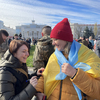Ukraine’s Kherson is haunted by screams from Russian basement detention : NPR


A crib burned in a police station in Kherson on Wednesday. The Kherson resident said that the Russians used the police station to detain and torture curfew violators and those suspected of cooperating with Ukrainian authorities.
Pete Kiehart for NPR
hide captions
switch captions
Pete Kiehart for NPR
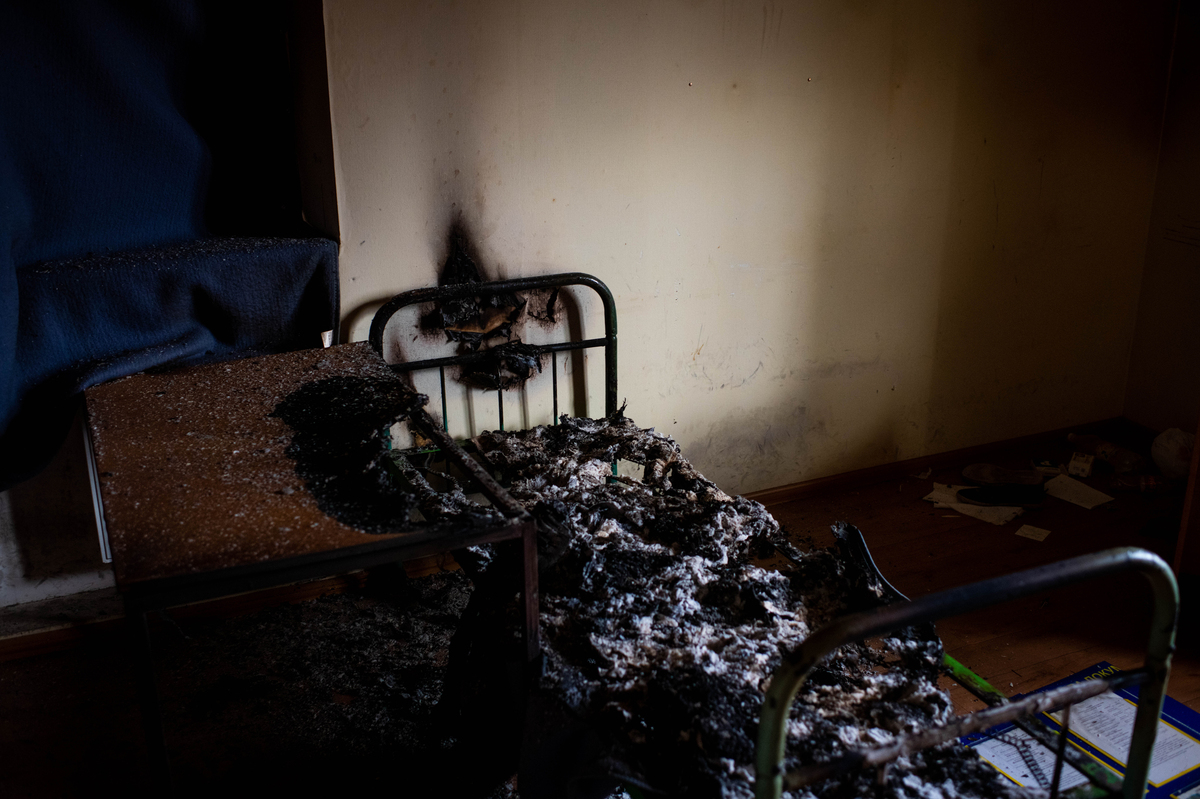
A crib burned in a police station in Kherson on Wednesday. The Kherson resident said that the Russians used the police station to detain and torture curfew violators and those suspected of cooperating with Ukrainian authorities.
Pete Kiehart for NPR
KHERSON, Ukraine — Just by speaking in Ukrainian they could be arrested and even tortured, residents say. Showing a Ukrainian flag was out of question. They say they endured daily humiliation and lived in fear during the Russian occupation of the southern Ukrainian city.
“People don’t take to the streets, except to buy basic things like food,” said Maryna Zinevych, 54, who has lived in Kherson all her life. “We’ve been under constant pressure, constant monitoring.”
These are just some of the chilling accounts of Kherson residents after eight and a half months of Russian occupation.
Today, Ukrainians celebrate and sing patriotic songs in the main square, a week after the Russian forces withdrew. But behind the festive atmosphere, a picture emerges of what the people have to endure under Russian rule. They describe cases of detention and abuse in an atmosphere of terror and suspicion.
“We heard these frantic screams at night”
When Zinevych spoke to NPR in the city’s Freedom Square, she wore a glittering Ukrainian flag wrapped around her shoulders like a shawl. Residents around her celebrate Russia’s withdrawal. People take selfies with a juicy watermelon — Kherson’s symbol.
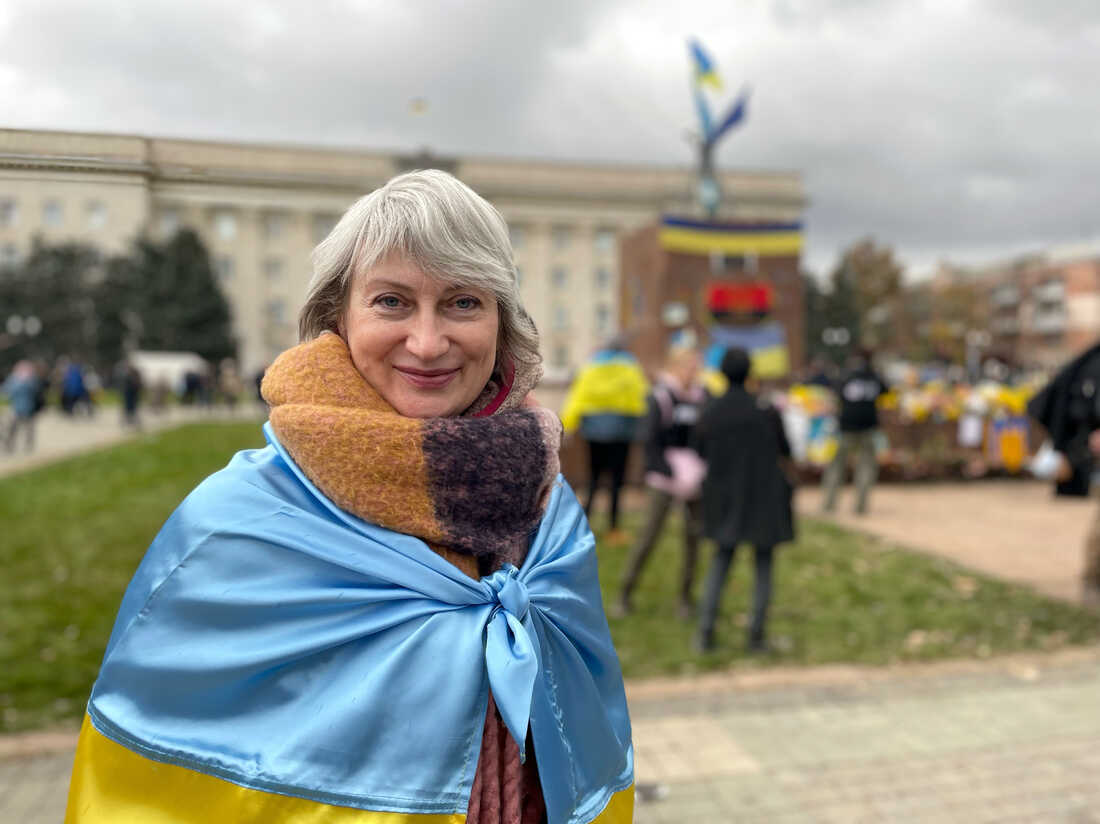
Maryna Zinevych, 54, in Kherson’s central square on Wednesday. Zinevych said of life under Russian occupation: “People don’t take to the streets,” except to buy basic things like food. “We’ve been under constant pressure, constant monitoring.”
Jason Beaubien/NPR
hide captions
switch captions
Jason Beaubien/NPR

Maryna Zinevych, 54, in Kherson’s central square on Wednesday. Zinevych said of life under Russian occupation: “People don’t take to the streets,” except to buy basic things like food. “We’ve been under constant pressure, constant monitoring.”
Jason Beaubien/NPR
The happy scene would not have been possible just eight days ago, before Ukrainian forces regained control.
Zinevych said that authorities installed by the Kremlin were constantly monitoring people they deemed “partisan” – anyone who could pass information to the Ukrainian authorities that could sabotage the occupation.
And in public, everyone must speak Russian.
“Because [speaking] Ukrainian or [showing] According to the Ukrainian symbol, you can be taken to the basement and tortured,” she said. “Basement” means detention centers set up by Russian forces.
One such facility is at a police station north of Kherson near Antonivskiy Bridge.
Mariya Kryvoruchko, who lives half a block from the police station, recalls the horrifying moments.
“We heard these frantic screams at night,” Kryvoruchko said. “There was screaming from the prison of the tortured at night. In the summer when you open the window, we hear it very clearly.”
As she spoke to NPR, suddenly an explosion rang out in the distance. Kryvoruchko did not flinch. “It’s extroversion,” she said, “don’t worry!”
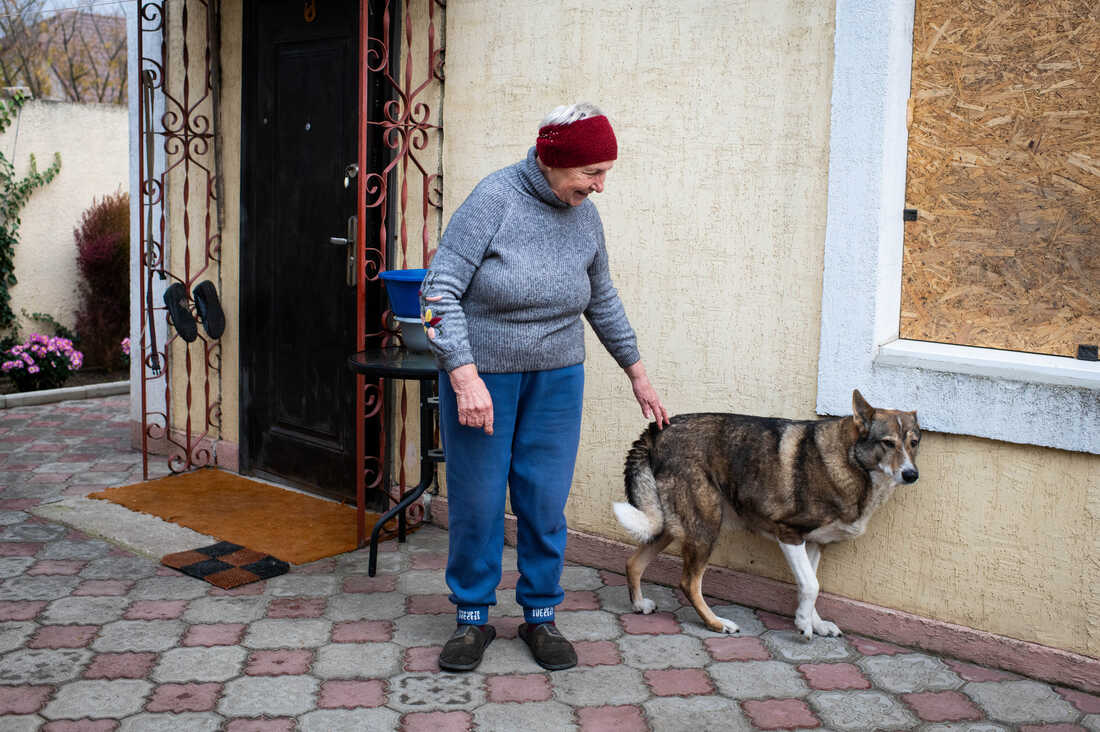
Mariya Kryvoruchko, 70, with her son-in-law’s dog, Sana, in Kherson was liberated Wednesday.
Pete Kiehart for NPR
hide captions
switch captions
Pete Kiehart for NPR
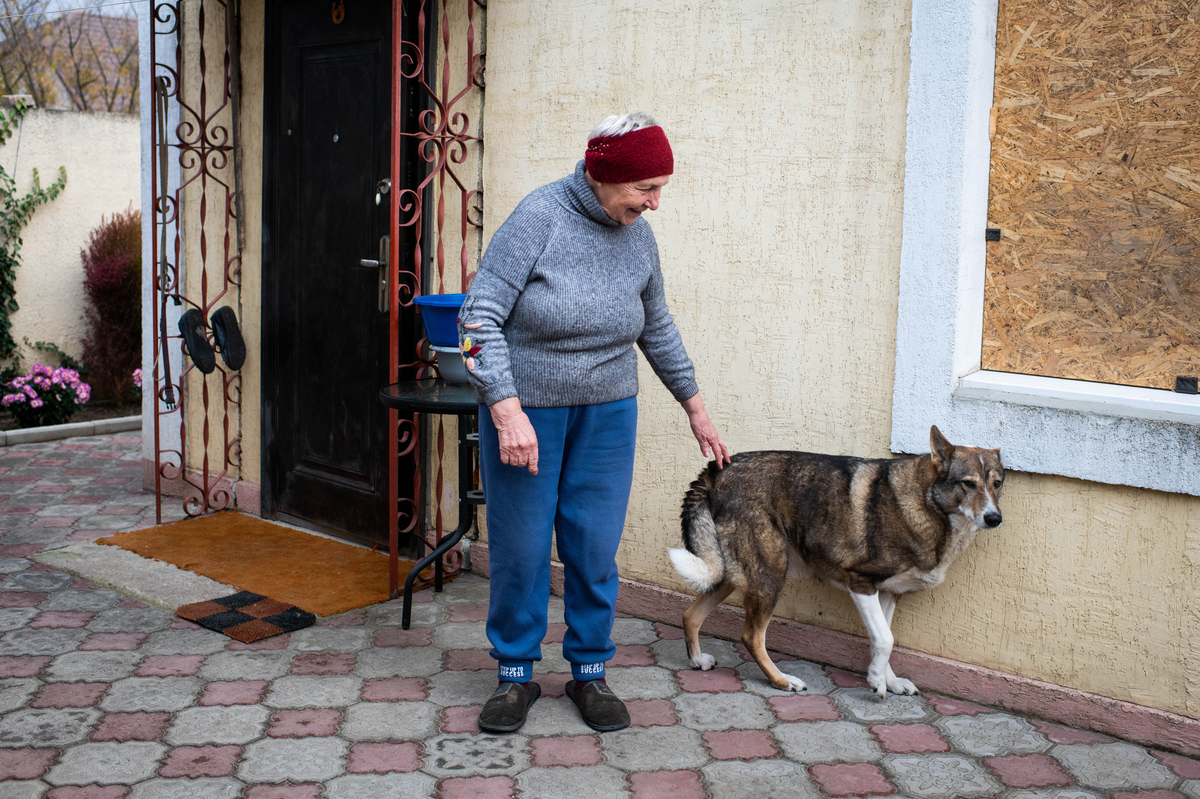
Mariya Kryvoruchko, 70, with her son-in-law’s dog, Sana, in Kherson was liberated Wednesday.
Pete Kiehart for NPR
The 70-year-old woman said she did not know anyone being detained or tortured at the police station.
“When I passed the police station, I was even afraid to look. [The Russians] was there with the gun,” she said.
He is suspected of being part of the underworld
One man who said he was detained there was Maksym Negrov.
He returned to the compound to find the cell where he was held from March to mid-April.
“The Russians have arrested everyone who holds pro-Ukrainian views,” Negrov said as he stood inside the now-abandoned police compound. Three vandalized vans with the emblem of the Ukrainian police removed with red spray paint sat in the yard.
The Russian captors beat and tortured all the detainees, including himself, he said.
Negrov, 45, served in the Ukrainian army when he was young. “I was detained on suspicion of participating in the resistance movement,” he said. “But at the beginning of the war, I was just a merchant.”
In the end, he said, the Russians let him go.

A damaged portrait of Russian President Vladimir Putin outside a police station that Kherson residents say was used by the Russians as a center for detention and torture.
Pete Kiehart for NPR
hide captions
switch captions
Pete Kiehart for NPR
Officials are investigating allegations of torture
Ukraine’s Parliamentary Commissioner for Human Rights Dmytro Lubinets said his office is investigating allegations of human rights violations and crimes against humanity by the Russian military occupying Kherson.
“These include torture in the basement, forced disappearances, taking civilians hostage and extrajudicial executions,” he said on Twitter. telegraphy messaging app.
UN investigators and human rights groups also say they are gathering evidence of torture and other abuses.
There is an implicit drag
Another man said he was part of what he called the “peaceful” underground resistance in Kherson. The 25-year-old has only given the codename Ivan because he says he is still involved in covert operations.
“They kept trying to arrest us,” he said.
Ivan is the coordinator of a group called the Yellow Ribbon Movement.
“We’ve hung up graffiti and yellow ribbons to remind people that Kherson is still Ukraine,” he said.
His group also distributed leaflets and posted flyers trying to help people resist the Russian occupation. One key message: Don’t take a Russian passport.
Moscow-backed authorities have been trying to issue residents with Russian passports, saying it would make them eligible for food aid and other assistance.
“They’ll try to force you to take their passport,” he said. And for young Ukrainians, he added, “their passport is like a ticket to join the army”.
According to Ivan, hundreds of men from Kherson were drafted into the Russian army. There have been reports of Russia sending Ukrainians to the occupied territories, but NPR has not confirmed how many.
As the Kremlin struggles to bring recruits to the front lines, Ivan said, “They want the Ukrainians to fight the Ukrainians.”
He said that now that Kherson has been released, its celebrations have been inspiring.
He is working with activists in Crimea and other Russian-occupied areas on guerrilla information campaigns and spreading the message that, no matter what the Kremlin says, those territories are part of Ukraine.
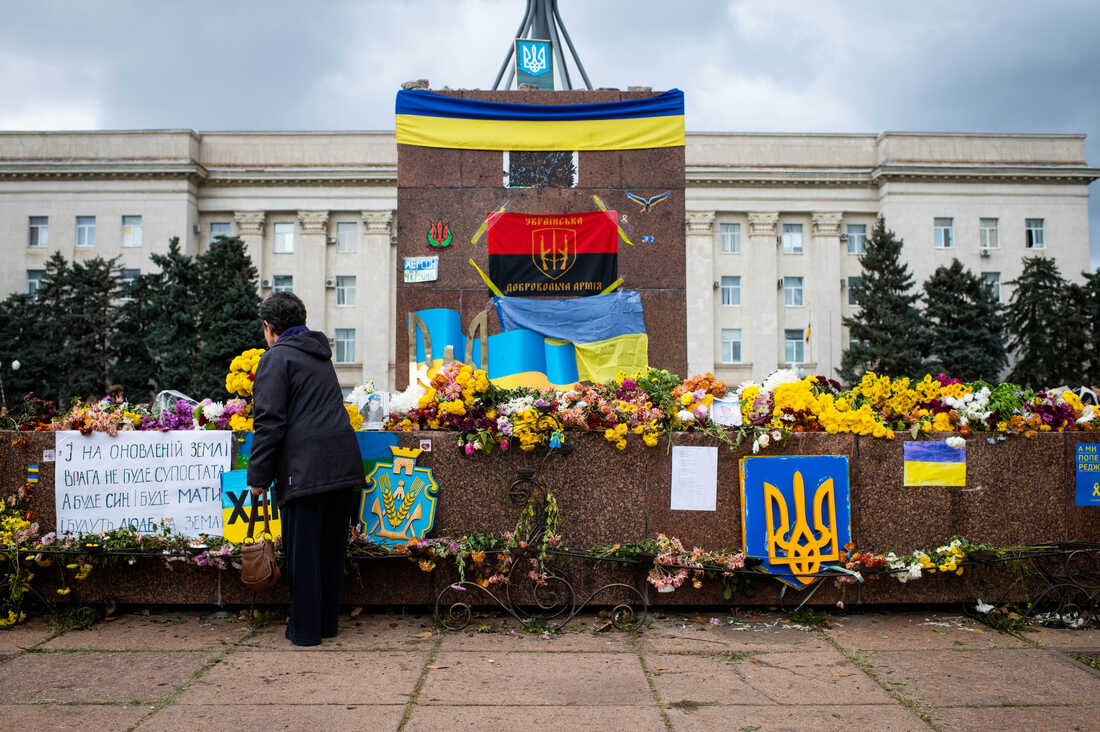
A woman lays flowers at a makeshift memorial on Kherson’s central square that was liberated Wednesday.
Pete Kiehart for NPR
hide captions
switch captions
Pete Kiehart for NPR

A woman lays flowers at a makeshift memorial on Kherson’s central square that was liberated Wednesday.
Pete Kiehart for NPR
